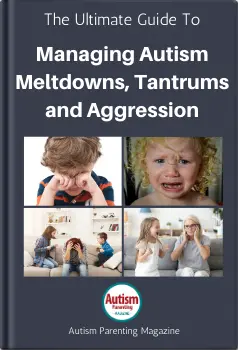This month, Dr. Temple Grandin answers parents’ questions about aggression.
What advice would you give to parents if they have a child whose diagnosis is Level 3 autism, and they have given up hope?
First of all, I need to find out the age of the individual. I would never put that label on a three-year-old because you just don’t know how the child is going to come out. I looked really terrible when I was three. Now, the one good thing is I did not have epilepsy. So, if you have a three-year-old and there are no signs of epilepsy, that’s usually a good sign.
But you’ve got to work with these little ones because when they’re very little, you don’t know how they’re going to come out. Now, the thing is, I have to find out more about this individual. Let’s say it’s an older child. Have we got meltdown issues and things like that? Let’s look at the main reasons for having gigantic meltdowns.

Download our FREE Parent’s Aggression Management Toolkit
The first one is frustration because they cannot communicate. The second is sensory overload, like in the middle of a busy store. The third is a hidden, painful medical issue. You’ve got to rule that out first.
Also, let’s say you have a nonverbal individual, and the behavior has been good, but all of a sudden, it’s awful. It’s probably hidden, painful, and medical. The common ones are tummy problems, constipation, toothaches, earaches, and urinary tract infections. You’ve got to rule that stuff out.
A desperate mother from the UK asks: “My 16-year-old son with autism and ADHD is becoming physically aggressive at home. He attacks me with his hands whenever he tantrums. What should our family do to help him to be less aggressive?”
Again, let’s look at the list:
- Frustration
- Sensory overload
- Hidden, painful medical issues
Sensory overload can happen because there’s a stimulating environment around.
Hidden, painful medical issues can also cause aggression. A common example would be acid reflux. There was a dad whose face was severely injured by his son, who had something in his face that was hurting. You’ve got to rule out that.
Now, when I got aggressive, it was in response to bullying. I was called a derogatory name, and then I retaliated by throwing a book at the girl. I got kicked out of school for that. That was definitely caused by bullying. But the things that I’ve already suggested, we’ve got to go through the checklist again.
Again, see if the behavior appears out of the blue and not at a busy store with sensory overload. Let’s say they are sitting quietly in their house, listening to their favorite music, and suddenly they blow up. That could be psychomotor epilepsy. This is extremely difficult to diagnose because you have to do a sleeping EEG with no sedatives, with all the wires and stuff on the head, which most of them won’t tolerate.
If the behavior appears to be more chronic, or your child is just on edge all the time, it could be because they’re hurting somewhere.
Tonya from Knoxville says: “My little girl is five and was diagnosed on the autism spectrum at one. As she gets older, her outbursts of anger seem to be happening more, happening quicker, and lasting longer. Discipline is not the answer. She self-harms during these episodes and also hurts me. She’s been in continuous therapy since she was six months old but doesn’t seem to have any learned coping skills from them. What can I do to help her feel calm during these times?
Some sensory integration strategies can sometimes work. Some respond very well to deep pressure. Others may respond really well to swinging. Since a lot of other things are not working, I would recommend getting an occupational therapist who’s really good at sensory therapies, trying some of those, and seeing if that helps.
The other thing you might have to rule out is checking everything on the neurological and epilepsy front. As previously mentioned, sometimes you can get psychomotor epilepsies, and they come completely out of the blue.
If the child uses language and there’s no antecedent – it’s not in the middle of a busy store but on the front lawn where everything’s quiet – I would have epilepsy-related issues checked out. That would require a neurologist.

Download your FREE guide on
Managing Autism Meltdowns, Tantrums and Aggression
One of the big problems is that medicine is getting so compartmentalized. I was talking to a psychiatrist just the other day about this, and she said they were trained to stay in the area where they specialize. Now, they’re discovering that some brain problems are caused by inflammation and autoimmune issues.
Professionals will have to go across disciplines to correct some of this stuff. I get very frustrated when the doctors say that the behavior is “just autism” when there’s something medically wrong with the individual.
Support Autism Parenting Magazine
We hope you enjoyed this article. In order to support us to create more helpful information like this, please consider purchasing a subscription to Autism Parenting Magazine.
Trending Products

SENSORY4U Weighted Lap Pad for Kids...

HunnmingRe Weighted Lap Blanket 7lb...

Kivik Weighted Blanket 3lbs, Blue D...

anfie Weighted Blanket Kids (36R...

Kidaddle 5lb Weighted Blanket (Grey...

HOSUKKO Weighted Blanket – 5 ...

yescool Weighted Blanket 5 Pounds C...

5lb Child’s Weighted Blanket ...

MAXTID Weighted Blanket for Kids 5l...




